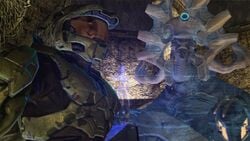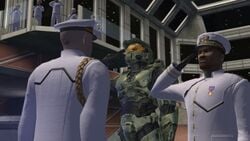The SPARTAN-II Program was part of the SPARTAN Program, an effort to produce elite soldiers through biological augmentation. The SPARTAN-II program would be the first in the series to meld advanced mechanical technology with the troopers' superior physiques.
History
Origins
Projections calculated by the UNSC Office of Naval Intelligence concluded that by 2525 the instability of the outer colonies would result in widespread rebellions unless drastic military measures were instituted. The SPARTAN-II program would meet these requirement, creating a small group of elite soldiers meant to subdue insurrections in their infancy with precision strikes. In this way, civilian casualties might be minimized, civil war averted, and costly conventional solutions made unnecessary.
The project was led by Dr. Catherine Halsey of ONI's Section 3 and Chief Petty Officer Mendez of the UNSC armed forces. Candidates for the program were selected from children deemed to possess superior physical and mental attributes. By 2517 150 suitable candidates had been identified, but for budget reasons only half that number were "conscripted". Most were between 5 and 7 years old. To preserve the program's secrecy the children were replaced by flash clones.
Taken to Reach these child-soldiers began training under CPO Mendez. To marginalize the civilian lives they had once led their names became a combination of their given names and a number (like “John-117”), with family names being discarded. Seven years later they began receiving the physical augmentations that would ultimately make them Spartans. The procedures were risky and nearly half died as a result. A small number survived but some were physically crippled (such as SPARTAN-084), and these were discharged from the program and placed in non-combat positions where their enhanced mental faculties might still prove useful. Only 33 survived without complications and, now much improved, remained fit for combat duty.
2525 would see the fulfilment of the program when the survivors were be fitted with the MJOLNIR Mark IV armor suit.
The Human-Covenant War
The conflict with the Covenant marked a change in the objectives of the program. Originally intended to quell rebellions the Spartans were now forced into battle against an opponent much superior to the UNSC. Although on an individual basis the Spartans were to frequently demonstrate their superiority over the enemy, the scope of their stunning successes was frequently only tactical in nature. Nonetheless, heroic rearguard and delaying actions saved countless human lives from the genocidal Covenant campaign. By this point the existence of the Spartans had become well known to the public.
Inevitably the small number of SPARTAN-IIs dwindled as casualties were sustained. As the exploits of the Spartans was a major propaganda boon to the UNSC, Section Two of ONI issued Directive 930 stating that Spartans killed or crippled would be listed as “missing in action” or “wounded in action”, thus maintaining the illusion of Spartan invincibility.
In late-2552 all except three of the remaining Spartans rendezvoused at Reach to receive new orders for an operation that HIGHCOM hoped would end the war. They would commandeer a Covenant vessel, locate the Covenant “homeworld”, and return with captured Covenant leadership. To this end the Spartans were slated to be re-equipped with MJOLNIR Mark V suits. The A.I. Cortana, carried within John-117's armor, would serve as the strike force's hacker and technology specialist.
However, all preparations were interrupted (and subsequently cancelled) by the Covenant assault on Reach. In the ensuing disaster most of the SPARTAN-IIs were killed. Two escaped, one critically wounded, aboard the UNSC Pillar of Autumn, while the rest remained trapped on Reach.
Following the events at Alpha Halo the Spartans were reunited at Reach. They then carried out a strike that resulted in the destruction of a Covenant fleet anchorage which contributed to the UNSC victory at the First Battle of Earth. SPARTAN-IIs would go on to play pivotal roles at the Battle of Onyx and the Second Battle of Earth.
Technology
Biological Augmentation
- Main article: SPARTAN-II Augmentation Procedures
Admiral Ysionris Jeromi of the research station Hopeful documented the following experimental procedures on Bonobo Chimpanzees. These operations were later performed on the Spartan soldiers:
- Carbide ceramic fossification
- Muscular enhancement injections
- Catalytic thyroid implant
- Occipital capillary reversal
- Superconducting fabrication of neural dendrites
MJOLNIR Armor
- Main article: MJOLNIR armor
The SPARTAN-II program was conceived in parallel with the development of the MJOLNIR armor. The Spartans received the first practical forms of the armor, the Mark IV, in 2525, followed by the Mark V and Mark VI in 2552.
The demands of the armor was such that only the Spartans could wear them. A number of baseline humans were killed attempting to use the suit during test trials.
Background
Surviving SPARTAN-IIs
The identities of the Spartans' full names have been deleted from the military records. These are the tags of all known Spartans, and their current status.
Begining of SPARTAN-II("First" Spartans) originally selected 150 potential candidates, however there was only funding for half that number, so the Spartan candidates were further scrutinized, producing 75 "test subjects."
SPARTAN-II("Second" Spartans) are these 75 "test subjects."
SPARTAN-III ("Third" Spartans) is not well known. However there were at least 1200 potential "test subjects".
SPARTAN-II: 2525
- SPARTAN-008: Li - Confirmed KIA by Covenant Plasma Torpedo
- SPARTAN-029: Joshua - MIA/KIA
- SPARTAN-030: Vinh - MIA/KIA
- SPARTAN-034: Samuel - Confirmed KIA, died first to actually destroy a Covenant ship in a non-ship to ship battle
- SPARTAN-039: Isaac - MIA/KIA during Battle of Reach
- SPARTAN-043: William - Confirmed KIA During A Raid On Onyx
- SPARTAN-044: Anton - Confirmed KIA by Covenant Plasma Torpedo
- SPARTAN-051: Kurt - Confirmed KIA During A Raid On Onyx
- SPARTAN-058: Linda - Active on Onyx
- SPARTAN-059: Malcom - Confirmed KIA during Battle of Reach
- SPARTAN-062: Maria - Retired
- SPARTAN-084: Fhajad - Discharged
- SPARTAN-087: Kelly - Active on Onyx
- SPARTAN-093: Grace - Confirmed KIA During Battle On Unyielding Heirophant
- SPARTAN-104: Fredric - Active on Onyx
- SPARTAN-117: John - Active on the Foreruner ship File:Master Chief with his MA5C.JPG117 is the Master Chief
- James - MIA/KIA
- Kirk - Discharged
- Rene - Discharged
- Cassandra - WIA
- Randall - MIA
- Sheila - Confirmed KIA during Battle of Miridem
- Gray Team - MIA
-Spartan Group Omega - Unknown
SPARTAN-II: 2537
According to the I Love Bees story line some Spartans were drafted or conscripted into the Spartan program eleven years after the second class of Spartans IIs graduated.[1] The only known Spartan from this third class is:
- Yasmine - Killed in Augmentation
Last known surviving Spartans IIs
- Main article: SPARTAN-II
The last known surviving Spartan IIs are:
- John-117
- Kelly-087
- Fred-104
- Linda-058
- Nicole-458 (In the 21st Century) (Playable character in Dead or Alive 4)
- Maria-062 (from the Halo: Graphic Novel story Armor Testing, retired)
- Members of the conspicuous Gray Team and those of class 3 still remain as well.
A number of SPARTAN-IIs disappeared under dire circumstances and are presumed dead. However, since nobody witnessed their final fate it is possible they may reappear later. Some of those that fit into this category are: Anton-044, Spartan-James (number unknown), Joshua-029, Isaac-039 Li-008 and Vinh-030.
There is also some confusion concerning the number of SPARTAN-IIs in general. In Halo: The Fall of Reach it is cited that 68 children were in the program two years after its initiation out of 75 that were originally drafted. No mention is made of the whereabouts of the missing 7. After the augmentation process all 75 reappear, with 33 being successfully upgraded, 12 surviving but being crippled, and 30 being killed as a result of the procedures.
The status of SPARTAN-IIs is muddied further in the novels. For example, Kurt-051 is listed as dead in 2531 when in reality he was drafted into the secret SPARTAN-III Program until his real death in 2552 on Onyx. Further ambiguity arises from page 260 of Halo: The Fall of Reach where three Spartans, designated “Gray Team”, were said to have been on “fields of battle too distant to be easily recalled” prior to the Battle of Reach. Their fates remain unresolved as in Halo: Ghosts of Onyx these three were said not to have been heard from for a year. Finally, it is not certain whether Cassandra is a Spartan or not.
Bungie has said that these discrepancies only seem to be errors, and that everything will be made clear in time.
Sources
| |||||||||||||||||
| ||||||||
It is said that John-117 was the only spartan to return from Reach without life threatening injuries


